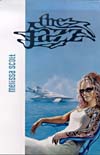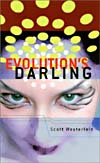
Comment
on this story
|
 |

Evolution's Darling knows where it is and Melissa Scott can't find it
by Adrienne Martini
The Jazz
Melissa Scott (Tor, $24.95)

These days, you can't believe everything you see. Any halfway intelligent person with a computer can manipulate any image or string of words in order to change the information conveyed. Want to make the public-at-large (at least the gullible ones) believe that Al Gore can do a mean meringue? Just slap his head on Ricky Martin's body, add some convincing text, and you've got a small population who think the VP is a dancing machine, even though common sense would tell you otherwise.
Of course, you never really could trust every last word or image that ever made it to print; even in Gutenberg's time factual slip-ups, both intended and un-, crept onto the printed page. But with the rise of the internet and the speed at which pseudo-data can now travel, misinformation can permeate most corners of the globe with frightening speed. Melissa Scott's The Jazz goes one step further than where we are now—as all good speculative fiction should—and plunks us in a world where hackers spin marvelous "jazz" (read: fiction) that the public wholeheartedly believes. From fake fad diets based on chakras to clandestine fairy tales about public figures, Scott's 'net is full of jazz, proving that anything found online should be scrupulously scrutinized.
Enter Tin Lizzy, a jazz spinner for one of the bigger sites, and Keyz, a young, suburban computer wiz who hacks into his parents' employer's mainframe and ends up in hot water. Keyz turns to Lizzy for help and the two begin a road trip across Scott's just barely futuristic landscape. Chasing this duo—who vaguely resemble Dorothy and Toto—are a dangerously crazed CEO and a couple of disgruntled rent-a-cops. Coincidentally, Tin Lizzy has been burned by this particular CEO before, and she will do anything to save Keyz from his clutches.
Scott takes this fairly predictable storyline and fills it out with eye-catching details, like her projected use of old offshore oil rigs as luxury housing. Her prose is workmanlike, always providing enough detail without ever really being evocative or consciously stylish. And this is what we've come to expect from Scott and her brand of cyberpunk-with-feminist-twist. But in The Jazz it falls flat. We've seen Tin Lizzy's type—the strong, shady bisexual with a hidden past—a time or two before in Scott's work and the character hasn't progressed. Keyz becomes nothing more than a plot twist that Scott lugs through the story, giving him some scant dialogue in the second half of the novel just so that the reader doesn't get too worried about what's become of him. If Scott had spent as much time developing the jazz of the people in The Jazz, even the most distrusting reader would have bought into the web she was spinning.
Evolution's Darling
Scott Westerfeld (Four Walls Eight Windows, $15.95)

A hypothetical: You hold in your hand two black boxes, each of which contain electronic information stored as ones and zeros. Those bits (and bytes) add up to an artificial intelligence, legally deemed a person by the social codes that have been created in this far-flung universe and time. The information in the boxes is identical —when asked the same questions, the same answers appear. Behavior is the same. Speech is the same. Beliefs are the same.
But one is a fraud, a bogus copy of the original. You have no way to discern which is which. So, the question is—does it matter which one you destroy? And is it murder, even though each box contains the same person?
It's a knotty question, this whole identity thing. And it gets more tightly tangled every day, with cloning and genetic therapy and the like. Most of the cells I was born with have divided, died, and been replaced by now. Does that make me the same person? Sure, my DNA is more or less the same as it was, but would it matter if I was exposed to a non-lethal dose of radiation that changed the code?
Like I said, complicated. Westerfeld's Evolution's Darling isn't, even though it ponders the same questions on a subtextual level and weighty ideas bubble up from the sub-surfaces of his concise-yet-poetic prose with ease. His characters are more than just props for these weighty philosophical goings-on; each has his or her own dramatic arc and moments of magnetic glory. It's quite a feat, especially given that the book runs just under 300 pages—proof positive that you can create a tense storyline, build a world, and ponder imponderables without resorting to churning out sequel after sequel.
But I shouldn't be surprised that Darling is a stunner. Westerfeld—probably one of the better writers you've never heard of—has proven that his first two science fiction novels Polymorph and Fine Prey were not flukes. Darling's plot moves at light speed, lingering with main characters like the machine/AI/man Darling, his young charge Rathere, a schizophrenic computer called The Maker, Mira, a female assassin who has lost her memories, and a sculptor who may or may not be dead. The intersections between these folks, set on a space opera scale, are violent—physically and mentally—and borderline brilliant. For the queasy, Darling wouldn't be a strong choice, despite its skill and panache, given the non-gratuitous violence and sex and torture. But for anyone who enjoys thought-provoking, bleeding edge work, Darling, you should rush right out and wrap your hands on this book, whoever you are.

September 21, 2000 * Vol. 10, No. 38
© 2000 Metro Pulse
|